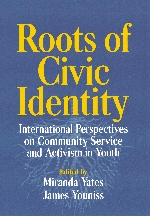Book contents
- Frontmatter
- Contents
- Preface
- List of Contributors
- Introduction: International Perspectives on the Roots of Civic Identity
- 1 Community Service and Political-Moral Discussions among Adolescents: A Study of a Mandatory School-Based Program in the United States
- 2 Social and Family Determinants of Community Service Involvement in Canadian Youth
- 3 Exploring Adolescent Altruism: British Young People's Involvement in Voluntary Work and Campaigning
- 4 Youth, Solidarity, and Civic Commitment in Italy: An Analysis of the Personal and Social Characteristics of Volunteers and Their Organizations
- 5 Political Socialization in the New States of Germany
- 6 Community Service and Social Cognitive Development in German Adolescents
- 7 Adolescents and the “Social Contract”: Developmental Roots of Citizenship in Seven Countries
- 8 Political Socialization in a Divided Society: The Case of Northern Ireland
- 9 Youth Experience in the Palestinian Intifada: A Case Study in Intensity, Complexity, Paradox, and Competence
- 10 Beyond the Call of Duty: The Service of Israeli Youth in Military and Civic Contexts
- 11 Recent Trends in Civic Engagement among Japanese Youth
- 12 Learning Politics in the Crucible: The Socialization of Taiwan High School Students as Citizens in a New Democracy
- Conclusion: Transcending Themes
- Author Index
- Subject Index
4 - Youth, Solidarity, and Civic Commitment in Italy: An Analysis of the Personal and Social Characteristics of Volunteers and Their Organizations
Published online by Cambridge University Press: 04 August 2010
- Frontmatter
- Contents
- Preface
- List of Contributors
- Introduction: International Perspectives on the Roots of Civic Identity
- 1 Community Service and Political-Moral Discussions among Adolescents: A Study of a Mandatory School-Based Program in the United States
- 2 Social and Family Determinants of Community Service Involvement in Canadian Youth
- 3 Exploring Adolescent Altruism: British Young People's Involvement in Voluntary Work and Campaigning
- 4 Youth, Solidarity, and Civic Commitment in Italy: An Analysis of the Personal and Social Characteristics of Volunteers and Their Organizations
- 5 Political Socialization in the New States of Germany
- 6 Community Service and Social Cognitive Development in German Adolescents
- 7 Adolescents and the “Social Contract”: Developmental Roots of Citizenship in Seven Countries
- 8 Political Socialization in a Divided Society: The Case of Northern Ireland
- 9 Youth Experience in the Palestinian Intifada: A Case Study in Intensity, Complexity, Paradox, and Competence
- 10 Beyond the Call of Duty: The Service of Israeli Youth in Military and Civic Contexts
- 11 Recent Trends in Civic Engagement among Japanese Youth
- 12 Learning Politics in the Crucible: The Socialization of Taiwan High School Students as Citizens in a New Democracy
- Conclusion: Transcending Themes
- Author Index
- Subject Index
Summary
The essence of voluntary organizations in Italy lies, first of all, in its deeply meaningful prosocial motivations; second, in the centrality of an outlook characterized by altruism and reciprocity that emphasizes gratuitousness in the volunteer's actions; and, finally, in the profound significance attributed to the value of solidarity. These three distinctive characteristics of voluntary action were brought together, ex post facto, at a legislative level (Law n. 266/1991 in Italian statutes) in order to define the social relevance of volunteer action. To be considered such, volunteer action must be offered “in a personal, spontaneous and gratuitous way, through the organization to which the volunteer belongs, without object of gain, even if indirect, and exclusively for the purposes of fostering solidarity” (article 2, paragraph 1.). This legislation formalized the distinction between traditional voluntary action performed by individuals and contemporary voluntary work performed within the bounds of an organization. These organizations, which expanded in the seventies and eighties, mostly make use of the work of volunteers.
Voluntary action has deep roots in Italy, springing from a long historical and cultural tradition that is still visible in the continuing presence in the country of large organizations that respond to a vast array of social needs. This is not, therefore, a phenomenon of recent origin but rather a long-standing one. It is characterized by internal differences both in cultural orientation such as whether they are Catholic or socialist and in the specific form each organization takes.
- Type
- Chapter
- Information
- Roots of Civic IdentityInternational Perspectives on Community Service and Activism in Youth, pp. 73 - 96Publisher: Cambridge University PressPrint publication year: 1998
- 1
- Cited by



